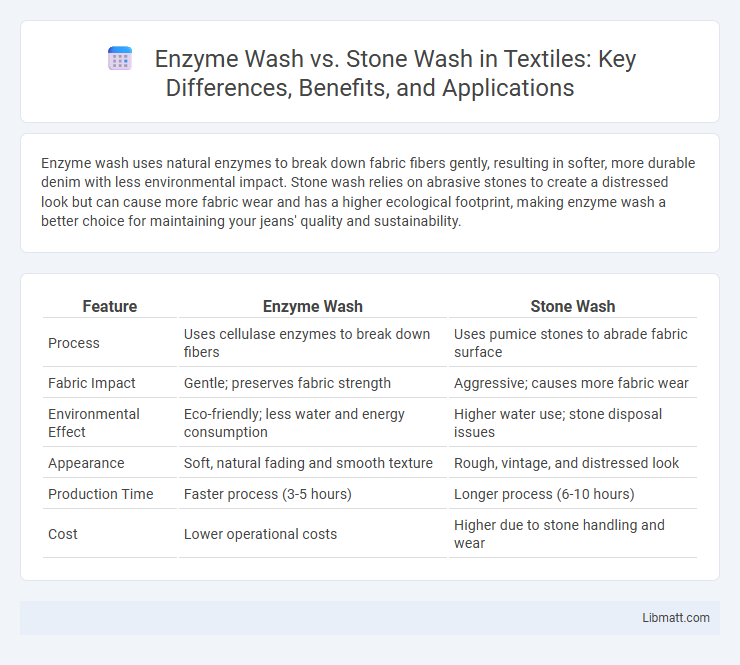Enzyme wash uses natural enzymes to break down fabric fibers gently, resulting in softer, more durable denim with less environmental impact. Stone wash relies on abrasive stones to create a distressed look but can cause more fabric wear and has a higher ecological footprint, making enzyme wash a better choice for maintaining your jeans' quality and sustainability.
Table of Comparison
| Feature | Enzyme Wash | Stone Wash |
|---|---|---|
| Process | Uses cellulase enzymes to break down fibers | Uses pumice stones to abrade fabric surface |
| Fabric Impact | Gentle; preserves fabric strength | Aggressive; causes more fabric wear |
| Environmental Effect | Eco-friendly; less water and energy consumption | Higher water use; stone disposal issues |
| Appearance | Soft, natural fading and smooth texture | Rough, vintage, and distressed look |
| Production Time | Faster process (3-5 hours) | Longer process (6-10 hours) |
| Cost | Lower operational costs | Higher due to stone handling and wear |
Introduction to Fabric Washing Techniques
Enzyme wash uses biological catalysts called enzymes to gently break down fabric fibers, providing a softer texture and a faded, worn-in look without the harshness of traditional methods. Stone wash involves tumbling denim with pumice stones to create a rugged, distressed appearance through surface abrasion. Your choice between enzyme wash and stone wash impacts the fabric's durability, comfort, and aesthetic appeal, making it important to understand these fabric washing techniques.
What is Enzyme Wash?
Enzyme wash is a textile treatment process that uses cellulase enzymes to break down cellulose fibers in denim, resulting in a softer texture and faded look without harsh abrasives. This eco-friendly method enhances fabric flexibility and reduces the risk of damage compared to traditional stone washing, which relies on pumice stones to physically distress the fabric. Enzyme wash offers improved color retention and less environmental pollution, making it a preferred choice in sustainable denim production.
What is Stone Wash?
Stone wash is a textile finishing process where denim or fabric is washed with pumice stones to create a worn, faded appearance and softened texture. This abrasive method removes surface dyes and enhances fabric durability while providing a vintage, distressed look. You can distinguish stone-washed garments by their unique rugged patterns and slightly rough feel compared to smoother enzyme-washed fabrics.
Key Differences Between Enzyme Wash and Stone Wash
Enzyme wash uses natural enzymes to gently break down fabric fibers, resulting in a softer, more uniform finish with less abrasion compared to the rougher texture produced by stone wash, which involves tumbling denim with pumice stones. Stone wash creates more pronounced fading and distressing effects, making each garment uniquely worn, while enzyme wash offers eco-friendly benefits by reducing water and chemical usage. Your choice between enzyme wash and stone wash depends on the desired fabric softness, environmental impact, and the specific aesthetic you want to achieve in denim.
Process Overview: Enzyme Wash vs Stone Wash
Enzyme wash uses natural enzymes to break down the cellulose fibers in denim, resulting in a softer fabric and a subtle fading effect, while stone wash involves tumbling jeans with pumice stones to create a more rugged, distressed appearance. Enzyme wash is eco-friendlier due to reduced water and chemical use, whereas stone wash can be harsher on both fabric and environment because of the abrasive stones. Your choice depends on whether you prefer a gentler, sustainable wash or a more textured, vintage look.
Impact on Fabric Quality and Texture
Enzyme wash uses biological catalysts to gently break down fabric fibers, preserving the integrity and softness of the material while creating a smooth, worn-in texture. Stone wash involves tumbling garments with abrasive stones, resulting in a more rugged, distressed appearance but causing greater wear and potential weakening of the fabric over time. Enzyme wash offers a more controlled texture with less damage, making it ideal for maintaining fabric durability and a softer hand feel.
Environmental Considerations
Enzyme wash uses natural cellulase enzymes to break down fabric fibers, resulting in less water pollution and reduced chemical waste compared to stone wash, which relies on abrasive stones that generate significant sludge and harsh effluents. The enzyme wash process is more energy-efficient, consuming less water and producing biodegradable byproducts, making it a more sustainable option for denim treatment. Stone wash's environmental impact is heightened by the large volume of water required to remove stone residues and the potential damage to wastewater treatment systems.
Cost Comparison
Enzyme wash typically costs less than stone wash due to lower water and energy consumption, making it more eco-friendly and budget-friendly. Stone wash involves heavier use of pumice stones, increasing production time and expenses, which reflects in higher retail prices. Your choice between the two should consider not only cost but also fabric softness and environmental impact.
Popular Uses in Fashion Industry
Enzyme wash is widely used in denim manufacturing to create a softer texture and achieve faded, worn-in looks without harsh abrasion, making it ideal for sustainable fashion brands aiming to reduce environmental impact. Stone wash employs pumice stones to create heavily distressed, vintage styles favored in casual and streetwear collections, delivering unique texture and depth to jeans and jackets. Your choice between enzyme wash and stone wash affects garment longevity and aesthetic, with enzyme wash offering subtle distressing while stone wash provides bold, rugged finishes popular in fashion trends.
Choosing the Right Wash for Your Needs
Enzyme wash utilizes natural enzymes to gently soften fabric and remove stains, making it ideal for those seeking an eco-friendly and subtle aging effect on denim. Stone wash employs pumice stones to create a more pronounced, distressed look with increased texture and fading, perfect for achieving a rugged, vintage style. Consider your desired fabric feel and aesthetic to determine which wash best suits your wardrobe preferences and durability requirements.
Enzyme Wash vs Stone Wash Infographic

 libmatt.com
libmatt.com